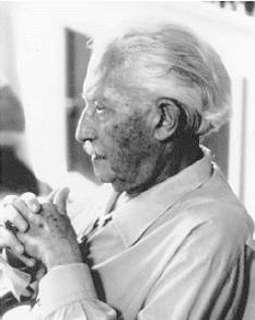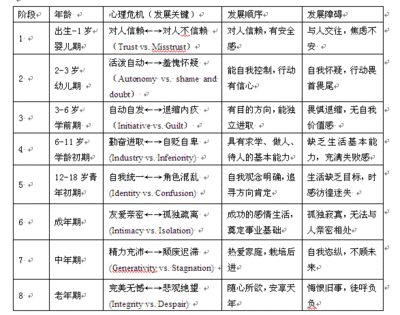Erik Erikson's Theory of PsychosocialDevelopment
艾里克森的心理社会发展阶段理论
What is PsychosocialDevelopment?
Erik Erikson’s theory ofpsychosocial development is one of the best-known theories ofpersonality in psychology. Much like Sigmund Freud, Eriksonbelieved that personality develops in a series of stages. UnlikeFreud’s theory of psychosexual stages, Erikson’s theory describesthe impact of social experience across the wholelifespan.
One of the main elements ofErikson’s psychosocial stage theory is the development of egoidentity.1 Ego identity is the conscious sense of self that wedevelop through social interaction. According to Erikson, our egoidentity is constantly changing due to new experience andinformation we acquire in our daily interactions with others. Inaddition to ego identity, Erikson also believed that a sense ofcompetence also motivates behaviors and actions. Each stage inErikson’s theory is concerned with becoming competent in an area oflife. If the stage is handled well, the person will feel a sense ofmastery, which he sometimes referred to as ego strength or egoquality.2 If the stage is managed poorly, the person will emergewith a sense of inadequacy.

In each stage, Eriksonbelieved people experience a conflict that serves as a turningpoint in development. In Erikson’s view, these conflicts arecentered on either developing a psychological quality or failing todevelop that quality. During these times, the potential forpersonal growth is high, but so is the potential forfailure.
Psychosocial Stage 1 - Trustvs. Mistrust
•The first stage of Erikson’s theory of psychosocial developmentoccurs between birth and one year of age and is the mostfundamental stage in life.2
•Because an infant is utterly dependent, the development of trust isbased on the dependability and quality of the child’scaregivers.
•If a child successfully develops trust, he or she will feel safeand secure in the world. Caregivers who are inconsistent,emotionally unavailable, or rejecting contribute to feelings ofmistrust in the children they care for. Failure to develop trustwill result in fear and a belief that the world is inconsistent andunpredictable.
Psychosocial Stage 2 -Autonomy vs. Shame and Doubt
•The second stage of Erikson's theory of psychosocial developmenttakes place during early childhood and is focused on childrendeveloping a greater sense of personal control.2
•Like Freud, Erikson believed that toilet training was a vital partof this process. However, Erikson's reasoning was quite differentthen that of Freud's. Erikson believe that learning to controlone’s body functions leads to a feeling of control and a sense ofindependence.
•Other important events include gaining more control over foodchoices, toy preferences, and clothing selection.
•Children who successfully complete this stage feel secure andconfident, while those who do not are left with a sense ofinadequacy and self-doubt.
Psychosocial Stage 3 -Initiative vs. Guilt
•During the preschool years, children begin to assert their powerand control over the world through directing play and other socialinteraction.
•Children who are successful at this stage feel capable and able tolead others. Those who fail to acquire these skills are left with asense of guilt, self-doubt and lack ofinitiative.
Psychosocial Stage 4 -Industry vs. Inferiority
•This stage covers the early school years from approximately age 5to 11.
•Through social interactions, children begin to develop a sense ofpride in their accomplishments and abilities.
•Children who are encouraged and commended by parents and teachersdevelop a feeling of competence and belief in their skills. Thosewho receive little or no encouragement from parents, teachers, orpeers will doubt their ability to be successful.
Psychosocial Stage 5 -Identity vs. Confusion
•During adolescence, children are exploring their independence anddeveloping a sense of self.
•Those who receive proper encouragement and reinforcement throughpersonal exploration will emerge from this stage with a strongsense of self and a feeling of independence and control. Those whoremain unsure of their beliefs and desires will insecure andconfused about themselves and the futur
Psychosocial Stage 6 -Intimacy vs. Isolation
•This stage covers the period of early adulthood when people areexploring personal relationships.
•Erikson believed it was vital that people develop close, committedrelationships with other people. Those who are successful at thisstep will develop relationships that are committed andsecure.
•Remember that each step builds on skills learned in previous steps.Erikson believed that a strong sense of personal identity wasimportant to developing intimate relationships. Studies havedemonstrated that those with a poor sense of self tend to have lesscommitted relationships and are more likely to suffer emotionalisolation, loneliness, and depression.
Psychosocial Stage 7 -Generativity vs. Stagnation
•During adulthood, we continue to build our lives, focusing on ourcareer and family.
•Those who are successful during this phase will feel that they arecontributing to the world by being active in their home andcommunity. Those who fail to attain this skill will feelunproductive and uninvolved in the world.
Psychosocial Stage 8 -Integrity vs. Despair
•This phase occurs during old age and is focused on reflecting backon life.
•Those who are unsuccessful during this phase will feel that theirlife has been wasted and will experience many regrets. Theindividual will be left with feelings of bitterness anddespair.
•Those who feel proud of their accomplishments will feel a sense ofintegrity. Successfully completing this phase means looking backwith few regrets and a general feeling of satisfaction. Theseindividuals will attain wisdom, even when confrontingdeath.
 爱华网
爱华网

